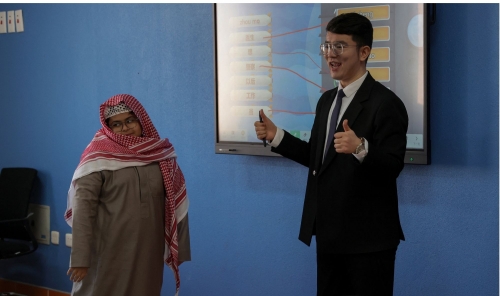Chinese lessons in Saudi schools show growing ties
AFP | Riyadh, Saudi Arabia
Email : editor@newsofbahrain.com
With a map of China on the wall behind him, 14-year-old Yasser al-Shaalan studied the names of professions in a Chinese textbook. He is one of thousands of Saudi children now learning the language at school.
Mandarin's introduction into public schools is the latest sign of growing ties between Saudi Arabia and China. The oil-rich Gulf kingdom is working to diversify its economy and strategic alliances.
Shaalan explained, "The pupils at the other schools are proficient in English. I know Arabic, English, and Chinese, which is a great asset for my future," in an interview with AFP.
In August, Saudi Arabia made China’s official language a compulsory second foreign language after English in six of its 13 administrative regions' schools.
Shaalan and his classmates have three Mandarin lessons a week, taught by their teacher, Ma Shuaib. He is a Chinese national and Muslim who is fluent in Arabic.
In their classroom in northern Riyadh, close to the Saudi headquarters of Chinese e-commerce giant Alibaba, Shaalan and his classmates learn Chinese characters displayed on an electronic whiteboard.
"At first, it was difficult, but now it has become easy and fun," Shaalan said.
Mandarin is one of the world’s most widely spoken languages, with the overwhelming majority of its speakers living in China.
'Language of the Future'
After visiting China in 2019, Saudi Crown Prince and de facto ruler Mohammed bin Salman announced a plan to introduce Chinese across the education system.
Since then, several Saudi universities have opened programs in Chinese. In 2023, Prince Sultan University in Riyadh inaugurated the kingdom's first branch of the Confucius Institute.
With China emerging as a major economic power, Mandarin teaching has become increasingly popular around the world, including in Europe. However, in 2022, Germany warned that the Confucius Institute language centers were being "used by the Communist Party for political ends."
Dozens of such centers have closed in the United States, Sweden, France, Australia, and Canada in recent years, following similar accusations.
In Saudi Arabia, no such concerns have been raised.
Ma, the Mandarin teacher, explained that while "Chinese is one of the most difficult languages," he uses "modern methods" to make learning easier.
"I use a digital board, gestures, and interactive games to motivate the students," he said.
While learning Chinese is compulsory, marks for the course do not count toward students’ overall grades.
"At the beginning, we focus on listening, speaking, and reading, then we move on to writing," Ma added. He teaches five classes a week at the Yazeed bin Abi Othman School.
Sattam al-Otaibi, the school’s director, said, "Chinese is the language of the future for economic communication. The world depends on China for many industries."
Thousands of Chinese nationals work in Saudi Arabia, particularly in Riyadh, where the airport now displays trilingual signs in Arabic, English, and Chinese.
'Changing Global Order'
Saudi Arabia is a long-standing partner of the United States, but it has also strengthened its relations with China and Russia. As the world's leading exporter of crude oil, Saudi Arabia sends about a quarter of its shipments to China.
This relationship has helped China become Saudi Arabia's leading trade partner, with two-way trade exceeding $100 billion in 2023, according to official figures.
Ties with Beijing have flourished under Crown Prince Mohammed’s "Vision 2030" project, aimed at diversifying Saudi Arabia's oil-dominated economy and improving its image abroad.
At the same time, US-Saudi relations have fluctuated. Former US President Joe Biden once pledged to make Saudi Arabia "a pariah" over the 2018 murder of dissident Saudi journalist Jamal Khashoggi, before later changing course.
China, a geopolitical rival to the United States, has worked to strengthen its influence in the Middle East. In 2023, it brokered a remarkable rapprochement between Saudi Arabia and Iran, two heavyweight rivals who had had no ties for years.
"For Saudi Arabia, the relationship with China has become one of the most important," said Umer Karim, an expert on Saudi foreign policy at the University of Birmingham.
Chinese President Xi Jinping has visited Riyadh twice, attending Gulf-China and Arab-China summits with regional leaders. Riyadh also hosted a Sino-Arab Investment Forum in 2023, where more than $10 billion in investment agreements were signed with Chinese companies.
As economic exchanges grow, hundreds of Chinese teachers have already arrived in Saudi Arabia. Additionally, Riyadh plans to send Saudi teachers to learn Mandarin in China.
"The move to teach kids Chinese aligns with the changing global order, where China has emerged as the global economic powerhouse," Karim said.
Related Posts

